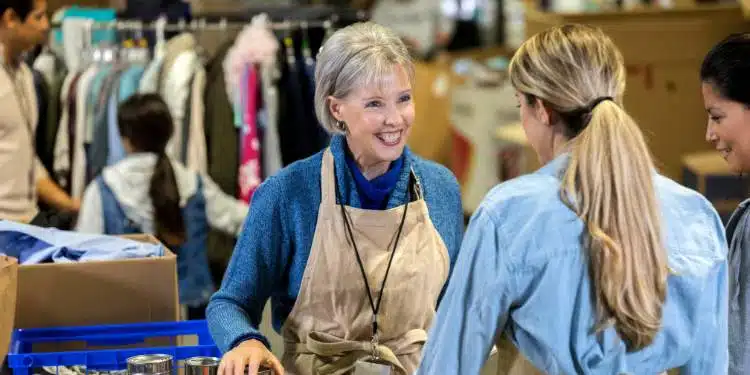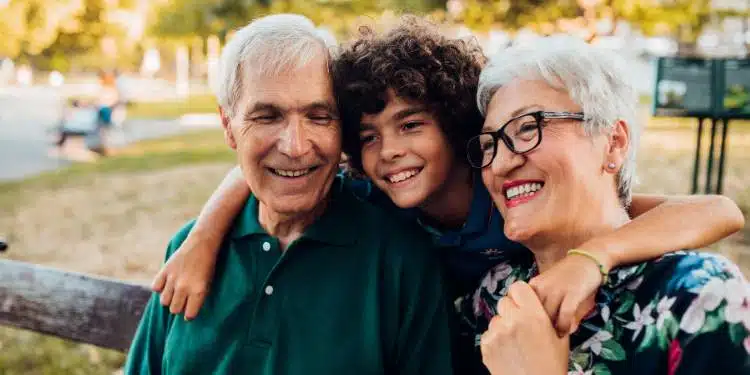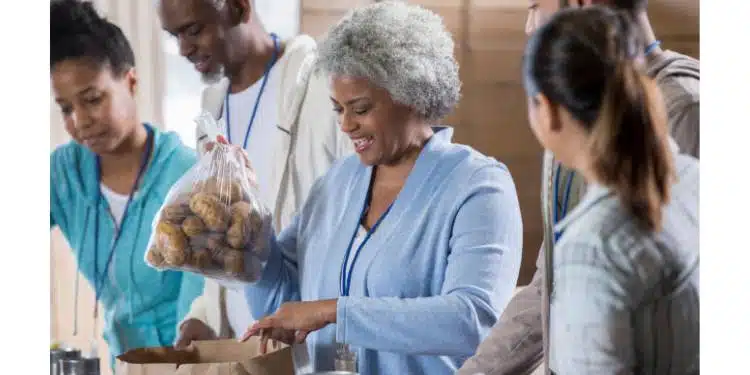by Atalaya Sergi, Director, AmeriCorps Seniors
Aging is universal. All of us do it, each and every day. But how can we enhance the quality of our years along with the quantity? According to studies, including the Harvard Study of Social Development, social ties and a sense of purpose are essential for our well-being as we age. The benefits of volunteering are many. It helps us build healthy social connections while making our communities better for everyone.
Skills, experience, and insight accumulate throughout our lives. Older adults have perspectives tempered by wins, losses, and hard-earned expertise. By reframing aging, our lives can gain momentum rather than slow down. We can accomplish so much after the age of 55. All of our many valuable skills and experiences can benefit our communities and generations to come. Let’s not waste the momentum that comes with longevity!

Benefits of Volunteering
Volunteering offers a wide range of benefits, both for us and for the communities and causes we serve. Here are some of the key volunteer benefits.
Personal Growth
- Skill Development: Volunteering provides an opportunity to learn new skills or hone existing ones, such as leadership, communication, problem-solving, and teamwork.
- Self-Confidence: As you take on new challenges and succeed in your volunteer role, you can gain confidence in your abilities.
- Personal Satisfaction: Helping others and contributing to a cause can provide a strong sense of personal fulfillment and purpose.
Social Connections:
- Networking: Volunteering allows you to meet a diverse group of people, potentially expanding your professional and social networks.
- Friendships: You can form meaningful friendships and connections with fellow volunteers who share your interests and values.
- Community Involvement: Volunteering often connects you with your local community and helps you build a sense of belonging.
Physical and Mental Health:
- Reduced Stress: Engaging in altruistic activities can reduce stress levels and improve overall mental well-being.
- Physical Activity: Depending on the volunteer role, you may engage in physical activities that contribute to your physical health.
- Increased Happiness: Studies have shown that volunteering can increase happiness and life satisfaction.
Community Impact:
- Positive Change: Volunteers play a crucial role in addressing community needs and making a positive impact on society.
- Support for Causes: By dedicating your time and skills, you contribute to the success of organizations and causes that rely on volunteer support.
- Building Stronger Communities: Volunteering strengthens the social fabric of communities and fosters a sense of unity.
Personal Fulfillment:
- Sense of Purpose: Volunteering can give you a sense of purpose and direction in life, helping you focus on what truly matters to you.
- Moral and Ethical Growth: It can promote personal values like empathy, compassion, and social responsibility.
Learning and Exposure:
- New Perspectives: Volunteering can expose you to diverse cultures, perspectives, and experiences, broadening your understanding of the world.
- Awareness: It can raise awareness about various social issues and inspire you to become an advocate for positive change.
Time Well Spent:
- Fulfilling Free Time: Volunteering offers a productive way to spend your free time and can be a more fulfilling alternative to passive activities.
Giving Back:
- Altruism: Volunteering is a way to give back to the community or causes that have positively impacted your life.
It’s important to choose volunteer opportunities that align with your interests, skills, and availability to maximize these benefits. Whether you’re dedicating a few hours a week or embarking on a long-term commitment, volunteering can be a rewarding experience for both you and the recipients of your support.
Volunteering for a Meaningful Second Act
As the Director of AmeriCorps Seniors. I am privileged to see older adults create positive change in their communities. I love watching our volunteers release responsibilities and roles from previous seasons of life and take charge of their second act. Their skills and experience become a force for the greater good while they make new friends and form meaningful connections.
For example, Carmen Swanson is an AmeriCorps Seniors volunteer with the Senior Companion Program serving at AgingNext, Claremont, Calif. She dedicates her time and compassion to supporting older adults with mobility challenges in her community. When asked how volunteering changed her, Carmen described the benefits of volunteering for her and how giving backfills her life with meaning.
“When you help others and do for others, you enrich your life. The real meaning of life is not in how much we had but in what we did,” said Carmen. “My favorite part is being available and of service to them.”

Community and Personal Benefits of Volunteer Work
Older adults like Carmen, who are long-time residents, have a comprehensive understanding of their communities that can inform any service effort.
The Volunteering and Civic Life in America report published by the US Census Bureau and AmeriCorps finds that Americans are volunteering fewer hours than we did two decades ago. This results in nonprofit organizations losing vital support and communities losing needed services. There is no shortage of opportunities for anyone to raise their hand for service and help inspire the spirit of service in others. No problem cannot be solved when Americans unite, when volunteers work together for the betterment of our communities, and not least of all, the benefit of our own lives.
There’s a Place for Everyone to Volunteer
Here are some great ways to give back in your second act. Consider the benefits of volunteering in these types of roles and how participation in these activities can enhance your life.
Put career skills to use after retirement.
I am continually inspired by the volunteers who choose to put their career skills to use for good long after they retire. American communities need older volunteers’ deep experience, long-range perspectives, and honed talents to innovate and solve challenges. Adults with decades of experience in conservation and construction can mitigate climate change and create a greener country. Retired teachers can improve early education and support young people experiencing classroom challenges. Listening to the most seasoned practitioners is crucial to addressing challenges with public health, public safety, community safety, food security, financial literacy, environmental restoration and so much more. Volunteers build houses, help with environmental restoration, tutor students, support young mothers, provide job training, prepare taxes, staff crisis hotlines, support disaster relief, deliver meals, offer tech support, aid veterans, grow community gardens, and more. Volunteers use their longevity’s momentum to improve their communities while shattering stereotypes about what it means to age.
Become a foster grandparent.
I grew up in a small rural community with grandparents across the street. In that multigenerational setting, I had mentorship, guidance, and a feeling of safety when trying new things. I always knew someone was there to care for me. Grandparents excel at supporting children in these ways. Children need patient and kind adults willing to read the same book repeatedly or wait as a child acquires a skill or concept. Older adults can effectively become grandparents without any biological connection. Volunteers offer kindness, guidance, social networks, and life experience to children who benefit socially and academically. Those who volunteer in this way receive so much satisfaction from their service that most serve for an average of six years. That time might encompass a child’s entire elementary, middle school, or high school experience. That is an immeasurable impact.
Become a senior companion.
I understand the concerns that come with aging. Those close to me must have access to caretaking support that can keep them in their homes as they age. I see through many volunteers the value of a reliable community for both companionship and independence. As more Americans choose to age in place, many will need help with shopping, cleaning, cooking, getting to appointments, paying bills, and other daily tasks. You can choose to help with these types of tasks and provide companionship. Volunteers may also give respite for family members caring for loved ones with chronic conditions. These efforts help people age in place and reduce social isolation and loneliness.
Documented Health Benefits of Volunteering
Volunteerism provides dual benefits where both volunteers and the people receiving services benefit from participation. Social isolation can exacerbate health issues, so older adults who volunteer and engage in the community may enjoy a better quality of life than similarly situated peers who do not volunteer. I could rattle off several anecdotes about volunteers who experienced improved health and well-being from volunteering. But we can move beyond what I witnessed firsthand and look at the data.
In a 2019 longitudinal study conducted by AmeriCorps Seniors, older adults reported the following benefits from volunteering:
- 84% reported improved or stable health after one year of service.
- 88% reported feeling more connected and less isolated.
- 78% reported less depression.
Another separate study published by BMJ Open found that volunteering amplifies happiness by reinforcing a sense of purpose, with the effect most pronounced among people ages 45 to 80.

How to Start Volunteering
There are opportunities nationwide to volunteer, from teachers and nurses to carpenters and local historians. Think about your skills and your experience. What does your momentum of longevity look like?
The sky is the limit. Your age is not. You can find a program that matches your interests and allows you to connect with like-minded peers who share your commitment to making the world a better place. Your second act is teeming with possibilities. And your community needs you. Here are some steps to help you get started with volunteering:
Self-Assessment:
Reflect on your interests, skills, and passions. What causes or issues are you most passionate about? What skills or talents can you offer as a volunteer?
Set Goals:
Determine your goals for volunteering. Are you looking to gain new skills, make new friends, or give back to a specific cause?
Research Opportunities:
Look for volunteer opportunities that align with your interests and goals. You can explore options in your local community or even consider virtual volunteering opportunities if physical presence is not possible.
Identify Organizations:
Find organizations that work on the causes you care about. You can use online platforms, local volunteer centers, or contact local nonprofits directly to inquire about volunteer opportunities.
Contact Organizations:
Reach out to the organizations you’re interested in to inquire about volunteer positions. This can be done through email, phone calls, or visiting their websites. Express your enthusiasm and inquire about their application process.
Fill Out Applications:
Many organizations require volunteers to complete an application or provide references. Be prepared to provide information about your background, skills, and availability.
Attend Orientations or Interviews:
Some organizations may ask you to attend an orientation session or interview to learn more about their mission, values, and volunteer expectations. This is also an opportunity for you to ask questions and clarify any concerns.
Training and Background Checks:
Depending on the volunteer role, you may need to undergo training or background checks. Ensure you comply with any requirements set by the organization.
Commitment and Scheduling:
Be clear about your availability and the time commitment you can offer. Some volunteer roles may require a regular schedule, while others may be more flexible.
Build Relationships:
Once you start in a volunteer role, get to know the people you work with, both fellow volunteers and staff members. Building positive relationships can enhance your volunteer experience and open up additional opportunities.
Explore Continuous Learning:
Consider taking courses or attending workshops related to volunteer work that interests you. This can help you enhance your skills and knowledge in the area you’re passionate about.
Are You Ready to Volunteer?
According to AARP, Americans aged 50 and older makeup 35 percent of the total population, and experts project this age bracket to grow to 132 million people over the next 10 years or so. Many find that contributing their skills, talent, and insights to volunteering in meaningful positions leads to healthier and happier aging.
Volunteering can provide a sense of purpose while offering opportunities for personal growth and development. It allows us to experience new challenges and connections that enrich our lives. By giving back and making a positive impact, we can find fulfillment and satisfaction during this phase of our lives.
About the Author: Atalaya Sergi
 Atalaya Sergi is the Director of AmeriCorps Seniors, the branch of AmeriCorps focused on engaging people aged 55 and over in outcomes-oriented service. She represents the spirit of more than 140,000 AmeriCorps Seniors volunteers who collectively contribute 47 million service hours annually. Atalaya has more than 20 years of experience in service, community engagement, and education, working in the public and nonprofit sectors to bring private and public organizations together to ensure people of all ages, as well as those living in underserved communities, thrive. Atalaya is a Next Avenue 2021 “Influencer in Aging.”
Atalaya Sergi is the Director of AmeriCorps Seniors, the branch of AmeriCorps focused on engaging people aged 55 and over in outcomes-oriented service. She represents the spirit of more than 140,000 AmeriCorps Seniors volunteers who collectively contribute 47 million service hours annually. Atalaya has more than 20 years of experience in service, community engagement, and education, working in the public and nonprofit sectors to bring private and public organizations together to ensure people of all ages, as well as those living in underserved communities, thrive. Atalaya is a Next Avenue 2021 “Influencer in Aging.”
About AmeriCorps Seniors: AmeriCorps Seniors, part of the federal agency AmeriCorps, is dedicated to strengthening communities across the country by pairing 55+ adults with service opportunities in their area. More than 140,000 older Americans are matched with volunteer opportunities each year through AmeriCorps Seniors’ three programs: RSVP, the Foster Grandparent Program, and the Senior Companion Program. To learn more, visit AmeriCorps.gov/Seniors.










